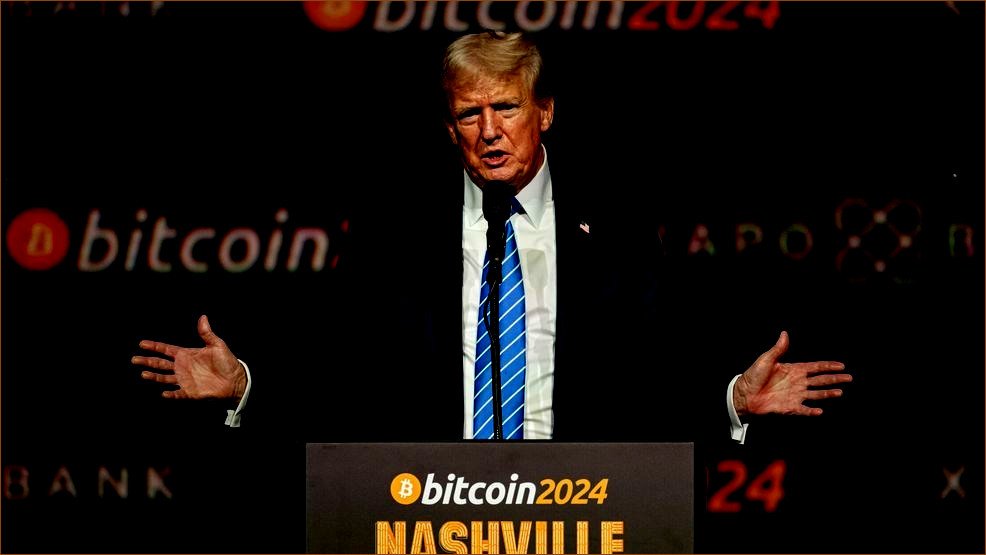In a world where cryptocurrency reigns supreme, a recent chilling statement from Federal Reserve Chair Jerome Powell has cast a shadow over Bitcoin’s brilliance. The esteemed Powell reiterated that the U.S. government has no intent or legal framework to establish a cryptocurrency reserve, tempering some of the fervor surrounding the digital darling. Yet, it’s essential to recognize that Bitcoin is still basking in the glow of its meteoric rise, especially since the days when Donald Trump first seized the Oval Office.
A staunch advocate for the cryptocurrency sector, Trump has surrounded himself with like-minded supporters in influential positions, fueling speculation and optimism in the crypto community. On that pivotal Election Day, Bitcoin soared to an impressive valuation of approximately $69,000. Following Trump’s electoral victory, the digital asset didn’t just rise — it skyrocketed past the astounding $100,000 mark in the wake of anticipated pro-crypto policies.
At the Bitcoin 2024 conference this summer, Trump declared his ambition to position America as the “crypto capital of the planet” and a leading global figure in Bitcoin. His appointments — notably those for treasury secretary and SEC helm — signal a clear pro-crypto stance, steering the dialogue towards a more favorable regulatory environment for digital currencies.
However, Powell’s firm stance on the government’s non-involvement in Bitcoin ownership rattles the foundations of crypto speculation. A mere day after his remarks, Bitcoin traded about 5% under its recent peak, underscoring the market’s sensitivity to regulatory cues. Leonard Kostovetsky, a finance professor at Baruch College, reflected on Powell’s announcement, asserting it aligns with the Fed’s overarching goal of stabilizing inflation and employment — making it clear that Bitcoin’s volatile allure holds little merit for federal monetary policy.
But what about Trump’s influence on the legitimacy of cryptocurrencies? Kostovetsky posits that while crypto enthusiasts may view the administration’s appointments as a beacon for diminished regulations, the reality of crypto’s standing transcends any political endorsement. In a tumultuous sea of rules and definitions, the fundamental question remains: what exactly is cryptocurrency? Is it a security? A commodity? Or does it exist in a nebulous realm, akin to an offhand wager on a Super Bowl coin flip?
Navigating the regulatory waters is a labyrinthine endeavor. The current SEC has approached cryptocurrencies as securities, attempting to regulate them through litigation against exchanges and token offerings. Such classifications only amplify the complexity, leaving many elements of cryptocurrency interpretation up for debate.
Roger Nober, director of the George Washington University Regulatory Studies Center, observes that the Trump administration could bring clarity and potentially a more streamlined regulatory framework for crypto. Yet the disarray of ideas surrounding the administration’s stance leaves many questions unanswered: who truly dictates the policy mindset?
Peter Whitehead, a senior engineer at RAND, likens cryptocurrencies to “lemons” from the used car market, highlighting the perpetual asymmetry of information that leaves buyers vulnerable. In a space that commands billions of dollars, the lack of transparency is a daunting hurdle for prospective investors.
The general understanding of cryptocurrency among Americans is staggering; as Kostovetsky notes, a recent poll revealed that only 18% of respondents felt they possessed a solid grasp of how crypto operates. Given its volatile nature — with price fluctuations sometimes exceeding 10% in a single day — the unpredictable landscape further complicates investment decisions.
Kostovetsky cautions the public to tread carefully in the cryptocurrency domain — akin to gambling rather than traditional investment avenues. Nober concurs, emphasizing that such volatility often deters those preferring the stability of stocks, bonds, or real estate.
Ultimately, the notion of the U.S. government establishing a Bitcoin reserve could serve as a powerful market signal of confidence. However, while the prospect may entice some, clarity from Congress on a statutory crypto framework would be far more beneficial in instilling trust and sustainability in this burgeoning market. The road to regulatory clarity is fraught with obstacles, leaving many in the crypto space in a state of hopeful anticipation.

